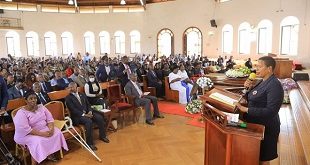
Mityana, Uganda | THE INDEPENDENT | Stakeholders in the mining sector have asked the government to invest in restoration and conservation of the environment for artisanal miners in a move needed to fight the adverse effects of climate change in the country.
Chris Musiime, the Programmes Director for Africa Center for Energy and Mineral Policy – ACEMP said that following the enactment of the mining law, there is need for regulations to create conditions for them.
He cited among them, the creation of zones and strengthen the inspection to ensure that the miners are complying with the law.
Musiime said that under the regulation, there is need to empower the local governments where the mining takes place by law because the current licenses were issued by the directorate of geological survey and mines but with the newly passed law, the licenses will be issued by the minister.
He said that by policy, there is need to involve the local authorities in the licensing processes because licenses are issued in areas that cover protected areas because the local authorities are not involved.
He also revealed that more than 90 percent of gold mining in Uganda is by artisanal means because the country has very few mechanized medium to mechanized large scale mining companies.
Musiime explained that indeed environment, conservation and ecosystem maintenance are a very big challenge in the mining sector saying that gold for instance is found in protected areas national parks, forests like in Buhweju areas, done in wetlands in central region while in the eastern region, it is near Lake Victoria. He said that forests and crops cannot survive in gold mining because it involves digging the ground but worse still they use mercury in extraction and processing stages.
Musiime explained that for mining that takes place underground like gold and tin, Musiime says that it takes a lot of wood used to strengthen the tunnels but without restoring the forests where they cut it from.
While commending the government for legalizing artisanal mining, Musiime appealed to authorities and environment watchdog to set boundaries and set specific zones for artisanal mines. For medium mining operations, Musiime said that the investment is huge but the operators there, are covering some of the challenges on environment on the basis that they are doing a formal operation.
He reasoned that when an operation is informal, the operators do not have the incentives to put conservation measures in place.
Musiime made the remarks at the ongoing stakeholders meeting hosted by Advocacy organization, Solidaridad in Mityana with a view of advocating for enabling policies that support the artisanal miners in the gold value chain to ensure the rights are respected and environment is conserved.
Alex Amanya, the programmes office for Solidaridad said that they organized the meeting under their claim for sustainability programme where they are seeking to ensure that the voice of the workers in the gold mining sector is heard.
He said that there is need for stakeholders to ensure natural resource management, descent work, fair value distribution and sustainable consumption. On environment, Amanya said they are working to ensure that the players sustain the environment for the next generations can benefit from it. He warned that failure of the players to adhere to the environment would adversely affect the environment.
However, the Secretary General of the Uganda Association of Artisanal and Small Scale Miners, Emmanuel Kibirige said that the adverse effects on environment are created by small scale miners because artisanal do not have money to use excavators, they do not use tanks but only use tanks to get the minerals.
He explained that artisanal miners do not go beyond 5 feet under the ground hence their effects on environment is minimal. Kibirige explained that mining entirely has adverse effects on the environment but because large scale mining is regulated and known, the focus tends to shift to the unknown.
On reclamation of land, Kibirige said that there are terms of reference where licences are issued and that where a miner fails to comply with the terms, the license can be cancelled.
****
URN
 The Independent Uganda: You get the Truth we Pay the Price
The Independent Uganda: You get the Truth we Pay the Price


